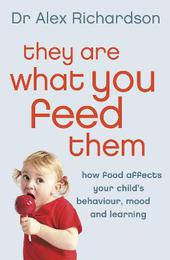
|
They Are What You Feed Them: How Food Can Improve Your Child's Behaviour, Mood and Learning
Paperback / softback
Main Details
| Title |
They Are What You Feed Them: How Food Can Improve Your Child's Behaviour, Mood and Learning
|
| Authors and Contributors |
By (author) Dr Alex Richardson
|
| Physical Properties |
| Format:Paperback / softback | | Pages:448 | | Dimensions(mm): Height 234,Width 153 |
|
| Category/Genre | Coping with illness
Child care and upbringing |
|---|
| ISBN/Barcode |
9780007182251
|
| Classifications | Dewey:649.3 |
|---|
| Audience | |
|---|
|
Publishing Details |
| Publisher |
HarperCollins Publishers
|
| Imprint |
Harper Thorsons
|
| Publication Date |
5 June 2006 |
| Publication Country |
United Kingdom
|
Description
Alex Richardson is a leading researcher into the role nutrition and environment play in ADHD, Autism, Dyslexia and other related conditions. She has combined her cutting-edge knowledge with her hands-on experience as a teacher in a 12-week plan that will transform the lives of children with these conditions * Dyslexia, ADHD, Dyspraxia and Autistic Spectrum Disorders (ASD) affect at least 25 per cent of the school population and parents and teachers are desperate for clear, reliable information on how to support and help children with such behavioural and learning difficulties. * Current methods of diagnosis and treatment pay no attention to the role of nutrition, despite evidence that diet can affect brain development and function, behaviour and learning. Our author has headed up cutting-edge research in this area. * This is the first book available in the UK that provides accessible and practical information for parents to help them create their own plan to work with their child's nutrition, lifestyle and environment * Dr Richardson explains translates the latest research on brain development and function into essential practical knowledge that people can use to enhance their own and their children's lives.
Author Biography
Alex Richardson is a leading researcher into the role of nutrition in ADHD, Autism, Dyslexia and other related conditions and is based at Oxford University's Department of Physiology, Anatomy and Genetics. Her highest profile research has been the Oxford-Durham Study involving supplementing children's diet with fish oils - and with staggering results. Alex has a strong media profile and is regularly interviewed or quoted in all areas of the media, including Radio 4, BBC1 Six O'Clock News, Lord Robert Winston's science series, Discovery Channel, Daily Mail, Daily Express, The Independent, Sunday Telegraph, Sunday Times. Alex is a founder director of the UK charity Food And Behaviour Research, and also a former teacher with first-hand experience of managing children with behaviour and learning difficulties. She understands full well that any remedial plan to help parents help their children must be practical and easy to implement.
Reviews'Jamie Oliver visited [Alex's department] while preparing his series on school dinners. It was the hard-slog science of the physiology department that gave credibility to the link between children's diet and their behaviour that Oliver made so powerfully in his TV programmes.' Guardian (May 05) 'Food affects behaviour. If you paid attention to diet, you could really make a difference.' Guardian (May 05) 'It's imperative that while upping your intake of omega-3, you cut out the junk.' Alex quoted in Independent March 2005 "If you think about badly behaved children with their low frustration tolerance, classroom fights and throwing things at the teacher, these are things that seem to improve in some children if you give them enough omega-3." -- Alex quoted in OBSERVER FOOD MONTHLY, April 2005 "Everyone's aware that a lousy diet is bad for your physical health but it has taken a lot longer for people to twig that the brain is also part of your body and is possibly the first place you would be likely to see an effect." -- FT MAGAZINE, March 2005 "If children slurp cans of Coke on the way to school it puts them on an artificial high in terms of brain function, but that instantly stimulates the release of too much insulin which causes blood-sugar levels to plummet. In a short time their brains are in a fog. They can't concentrate, they are irritable and find it hard to hold on to stable emotional reactions." --TES, April 2004
|